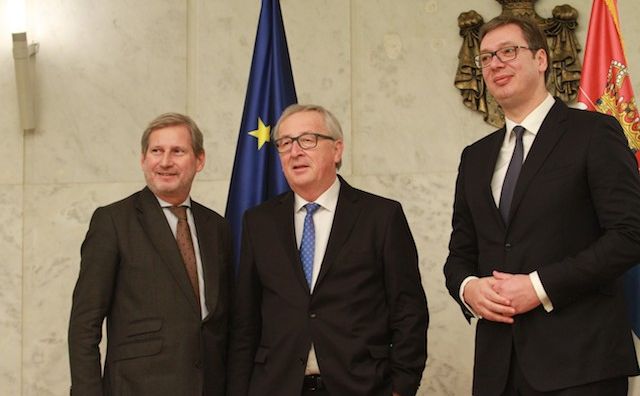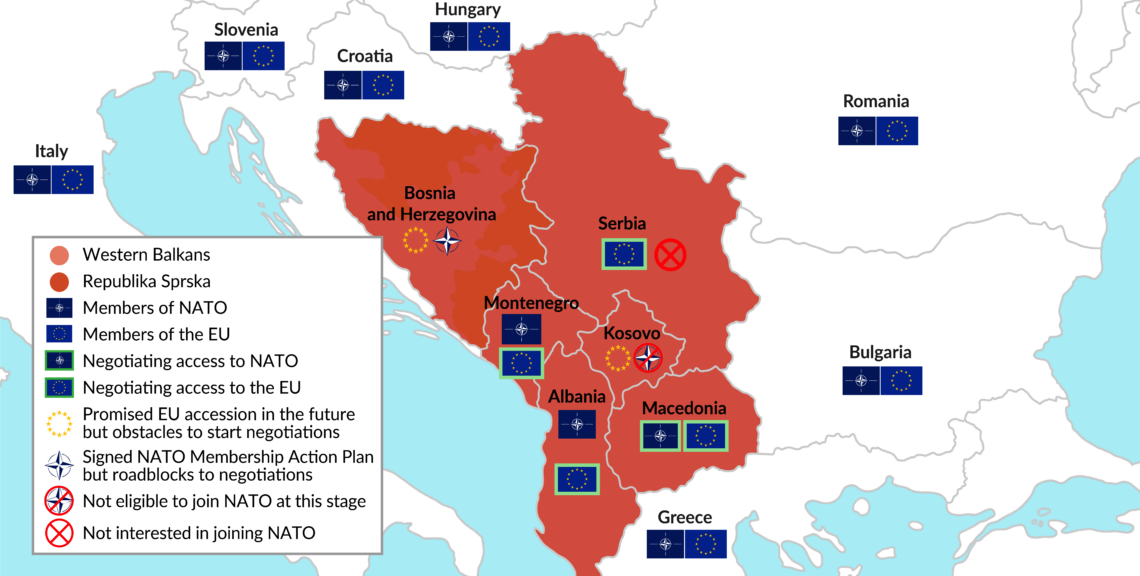The Balkans’ next challenge: curb corruption
Decades of stabilization policies prevented new wars in the Western Balkans, but democratic governance is hardly flourishing in the region. Under the guise of promoting stability, corrupt oligarchies have rigged political systems, effectively capturing states and making them unfit to join the European Union and NATO.

In a nutshell
- The EU unveiled a new accession strategy for the Western Balkans, but the criteria for admitting these states will not be relaxed
- Fighting the corruption that permeates the region and democratizing governance systems are the West’s key goals
- The stakes are high, as failed states in the region would endanger NATO’s southern flank
The Western Balkans are under pressure to enter a new transition. After nearly a quarter of a century of post-conflict policies, aimed at stability and good neighborhood practices, the European Union and the United States are jointly pushing for democratic governance in the region. Western powers want it anchored on stable institutions, efficient public administration and an unconstrained, independent judiciary. All those desirables cannot materialize, however, without first eradicating the deeply entrenched culture of bribery and political patronage in the Balkans.
Widespread corruption is a shared challenge for Albania, Bosnia and Herzegovina, the Republic of Macedonia, Kosovo, Montenegro and Serbia. Elections failed to democratize and improve the way these countries are functioning. Their establishments have maintained a firm hold on the governments, recycling their power and, in effect, “capturing” the states, as a 2016 report for the European Council pointed out.
Stubborn problem
In a briefing of a European Parliament Think Tank from April 2017, the situation was described this way:
“The Western Balkan countries have taken a number of anti-corruption steps, such as adapting legislation and establishing dedicated anti-corruption institutions with both preventative and repressive competences. They are also parties to all relevant international conventions. The Commission, as well as various international organizations, has measured annual progress in that respect, and the EU has supported anti-corruption efforts financially and through sharing expertise. Yet, the latest 2016 assessments show that corruption continues to permeate the region. Although the legal and institutional framework is largely in place, and the EU has prioritized good governance reforms in the pre-accession process, the concrete results achieved on the ground are disproportionally low.”
The Council forcefully called on the Balkan countries to address this problem. U.S. diplomacy, too, is on an all-out diplomatic offensive on the anti-corruption front. Without tackling its structural and systemic challenges, it is feared, the Balkans may degenerate into a collection of failed states. The geopolitical ramifications of such a scenario would be grim for the region and the rest of Europe.
Push comes to shove
In early February 2018, the EU unveiled a new accession strategy for the Western Balkans to breathe new life into the stalled process. However, the strict criteria for admitting the candidate states – set by the European Council in Copenhagen (1993) and Madrid (1995) – will not be relaxed. European Commission President Jean-Claude Juncker emphasized this point to Balkan leaders during his latest tour of the region in the second half of February 2018.
The EU will no longer tolerate bending the rule of law in the Balkans in the name of security or granting amnesties to corrupt political bosses.
The EU initiative, supported by the U.S., aims at a fundamental, multifaceted democratization within a decade. In 2018-2025, the societies in the region are supposed to transform from a “post-conflict” to a “post-corruption” functioning mode. To listen to Brussels, the EU will no longer tolerate bending the rule of law in the Balkans in the name of security or granting amnesties to corrupt political bosses. It demands the big-fish “untouchables” in the region to be brought to justice – if need be, with aid from Western law-enforcement agencies. Not accidentally, experts from the U.S. Federal Bureau of Investigation (FBI), Germany’s Federal Intelligence Service (BND), or Italy’s Guardia di Finanza have been paying frequent visits to the Balkans lately.
Domestic law-and-order agencies in the region are being expanded and energized to reduce the operating room for political mafias and challenge oligarchy governance (based on, for example, currency manipulation). Montenegro established a special court in 2016, now dealing with the first batch of high-level defenders. In Macedonia, which went through an explosive wiretapping scandal in 2015, a new, Special Prosecutor’s Office has been set up. In Albania, a “vetting law” passed in 2016 is supposed to monitor the competence and professional integrity of judges and prosecutors, with special attention paid to their independence from organized crime and political patronage. In both Albania and Macedonia, chief state prosecutors were replaced in 2017.
The judiciary branch remains the most fragile element of the governance system in the Balkans. In a recent poll in Macedonia, as many as 66 percent of respondents described the country’s courts and judges as corrupt.
Corruption’s curse
The region’s states also draw their lessons from the experience of other EU candidates. Some 15 years ago, Slovakia’s EU application was held back until the resignation of its Prime Minister Vladimir Meciar (1990-1998), who was implicated in state-sponsored crimes. And Croatia signed an association agreement with the EU as early as 2001, but it was able to join the community only in 2013, after its corruption-tainted former prime minister was sent to court.
Corruption is Balkans citizens’ ever-growing source of anxiety. According to a Balkan Barometer’s comprehensive perception survey across the seven Balkan nations (published by the EU-funded Regional Cooperation Council), the percentage of respondents who described corruption as one of the key problems more than doubled between 2015 and 2017, from 15 to 32 percent. In 2017 alone, Macedonia dropped 17 places in Transparency International’s corruption perception index, down to 107th place out of 180 countries.
The percentage of respondents who described corruption as a key problem more than doubled between 2015 and 2017.
Corruption exacts a high toll in economic stagnation and increased public debt across the region, as data from its central banks and international monitoring organizations show. Foreign investors also do not flock to corruption-infested countries. In Forbes magazine’s “Best Countries for Business” ranking, Macedonia took a dive from the high position of 31st in 2014 to only 63rd in 2017.
On the other hand, support for integration remains high in most Balkan societies: according to EUobserver, in December 2017 such support reached 90 percent in Kosovo, 80 percent in Albania and 54 percent in Macedonia, although it was only 26 percent in Serbia.
Facts & figures
The Western Balkan's tortuous road to integration with the West

For the Balkans, corruption has dangerous geopolitical consequences as well. In the absence of the rule of law, security risks proliferate. The region attracts non-Euro-Atlantic players, as authoritarian regimes to the south and east seek similar local partners for their economic, political and military ventures. Analysts already have been warning that in 2018 the southern flank of NATO (including the Balkans) would be one of five potential “crisis regions.”
New mobilization
In response, the West has been trying to shore up this southern flank by mounting a diplomatic effort to accept the Republic of Macedonia to NATO (the country will need to slightly alter its name to have Greece withdraw its longstanding veto). The EU, meanwhile, is updating its enlargement policy to account for the Balkans’ special needs. The EU Stabilization and Association process (SAA), launched two decades ago, was mostly a post-conflict policy, rather than a democratization strategy for the region. Now, we are supposed to witness the end of the era when EU leaders passively watched Balkan politicians expand authoritarian practices at home in the name of “maintaining regional stability” and let themselves be blackmailed with talk of non-Western “strategic alternatives” for their countries. From this year on, the SAA is gone and the Democratization and Accessions will be the new game’s name.
A “five C,” “Anti-corruption Spring” of 2018 is supposed to launch the process of reclaiming the Balkan states for democracy, with assaults on “Corruption, Criminality, Clientelism, Canabization and Columbization.” The first highly ranked state officials are expected to be brought to courts in Albania and Macedonia. Also, the Kosovo Special Chambers and Specialist Prosecutor’s Office, located in The Hague and set up to pursue war criminals, is under serious Western pressure to launch its activities.
Brussels and Washington wield a big stick: if governments in the Balkans continue to fail to take meaningful action against corruption and crime, the international community is ready to set up an international tribunal for the region’s criminals. Democracy cannot take root without effective law enforcement. Watching passively as crooked regimes and transnational organized crime destabilize this strategic region would lead to high geopolitical risk for all of Europe. Western leaders seem more determined than ever to prevent this from happening.
Two scenarios
In the first, optimistic and rather likely scenario, the EU and the U.S. get their way in one of the most volatile regions in the world. Washington and Brussels have coordinated their activities in the Western Balkans in 2018 and this may work.
In February, the European Commission adopted “A credible enlargement perspective for and enhanced EU engagement with the Western Balkans,” which states in no uncertain terms that the EU is ready to admit the region’s countries, but only those that have met the accession criteria. In May, the Bulgarian presidency will push forward the accession issue in the EU “Balkans summit” in Sofia, reintroducing the almost forgotten “Thessaloniki agenda” of 2003, which famously declared that “[t]he future of the Balkans is within the European Union.”
At the beginning of June 2018, the European Council will set down specific accession steps for each individual Balkan country. During a NATO summit at the end of that month, the U.S. will strive to finally make Macedonia a member of the alliance. During the summer, when London is to host the fifth round of the “Berlin Process” (launched by Germany in 2014 to champion the EU expansion ideals), the UK is expected to express its strong support for Balkan accession, Brexit or no Brexit.
In this optimistic script, Albania and Macedonia will start their EU accession negotiations in 2019 – after delivering tangible results of their judiciary and security reforms: the implementation of the vetting process in Albania against corrupt judges and prosecutors, and the first court decisions on special prosecutors’ charges in Macedonia.
Montenegro and Serbia, often described as Commission President Juncker’s “two favorites,” are expected to move forward fast, mostly due to geopolitical considerations. The former state has no particular connection with Russia, while the latter is expected to gradually depart from its pro-Moscow orientation. Having opened 30 out of 35 accession chapters, Montenegro will sail smoothly to the final phase of the talks. Belgrade, which has managed to close 12 chapters, will progress further –assuming that in 2018 Serbia deletes a phrase from its constitution that describes Kosovo as an “integral part” of the country. Serbia is not interested in joining NATO.
Bosnia and Herzegovina and Kosovo will not achieve EU candidate status in 2018. The first country faces internal obstacles from its Republika Srpska. Kosovo has an unresolved border demarcation issue with Montenegro and infuriates its Western friends by not letting its special court (created in 2015 by Kosovo’s parliament at the urging of the West) to prosecute war crime cases related to the country’s independence war (1998-1999). There has long been talk of imminent indictments and Albanian VIPs facing arrest, but thus far the opposition among the Kosovan ruling elite to such prosecution has proven effective. So, in 2018 Kosovo is likely to obtain only the right to visa-less travel in the EU.
The pessimistic, less likely scenario boils down to a failure of the anti-corruption, rule-of-law drive. If this latest attempt at reasoning with the Balkan elites comes to naught and the traditionalists prevail again in resisting the states’ cleanup, NATO and the EU will not lower their standards to let these countries across the Euro-Atlantic Rubicon.
The EU, especially, is fed up with populist regimes, including those in its own member states, as its tentative steps against Poland and Hungary for allegedly violating “union values” may attest. Therefore, the West might eventually run out of patience and/or political energy in trying to salvage the incorrigible “captured states” in the Balkans. Left alone, these states are likely to fall into the orbits of outside, anti-Western powers and, in many cases, succumb to chaos. The broader security consequences of such a scenario are hard to assess.








